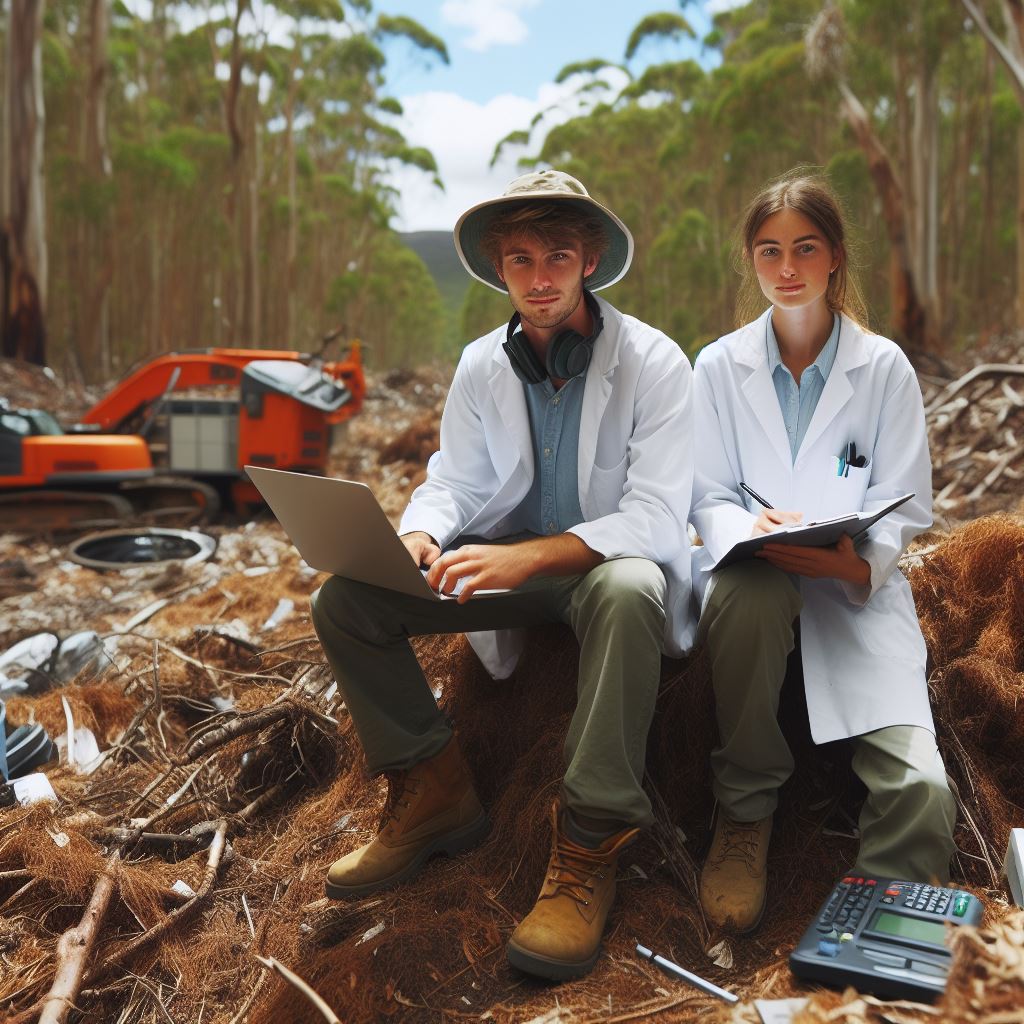Introduction
In Australia’s eco-science landscape, the integration of Indigenous knowledge stands as a cornerstone for holistic environmental understanding.
Indigenous communities have rich, traditional ecological knowledge, offering insights into sustainable land management practices.
This symbiotic relationship between scientific research and Indigenous wisdom fosters a comprehensive approach to environmental conservation.
Indigenous knowledge encompasses intricate understandings of ecosystems, biodiversity, and the delicate balance of nature.
Collaborating with Indigenous communities acknowledges their custodianship and strengthens the ethical foundation of ecological research in Australia.
It is imperative to recognize and respect Indigenous perspectives, acknowledging their profound connection to the land over millennia.
Incorporating Indigenous knowledge enriches scientific methodologies, promoting more effective and culturally sensitive eco-science practices.
Australia’s unique ecosystems benefit from this collaborative approach, leading to more accurate research outcomes and sustainable conservation strategies.
This blog section explores the dynamic interplay between traditional Indigenous knowledge and contemporary eco-science in Australia.
By embracing diverse perspectives, eco-scientists contribute to a more inclusive, respectful, and impactful approach to environmental stewardship.
Understanding Indigenous Knowledge
Definition and characteristics of indigenous knowledge
Indigenous knowledge refers to the traditional knowledge, practices, and beliefs that have been accumulated and passed down through generations by indigenous peoples. It is unique to specific cultures and is deeply rooted in their relationship with the natural world.
Characteristics of indigenous knowledge include
- Holistic: Indigenous knowledge views the ecosystem as interconnected and interdependent, recognizing the intricate relationships between animals, plants, and the environment.
- Oral Tradition: Indigenous knowledge is primarily transmitted orally through storytelling, songs, ceremonies, and rituals, rather than being recorded in written form.
- Place-Based: Indigenous knowledge is tied to specific geographical locations, as it is acquired through observations and experiences within their ancestral territories.
Importance of indigenous knowledge in preserving ecosystems
- Sustainability: Indigenous knowledge systems promote sustainable practices by emphasizing the conservation and sustainable use of natural resources.
- Biodiversity Preservation: Indigenous peoples possess valuable knowledge about the local flora and fauna, which contributes to the preservation and understanding of biodiversity.
- Climate Change Adaptation: Indigenous communities have developed specific strategies to adapt to environmental changes, providing insights into climate change adaptation and resilience.
- Traditional Ecological Knowledge: Indigenous knowledge incorporates traditional ecological knowledge, which offers holistic perspectives on ecosystem management, restoration, and conservation.
Examples of indigenous knowledge in Australian eco-science
- Fire Management Practices: Indigenous communities in Australia have a deep understanding of fire and its role in ecological processes. Their knowledge of controlled burns helps maintain biodiversity and reduces the risk of catastrophic wildfires.
- Bush Medicine: Indigenous knowledge of medicinal plants and their traditional uses has contributed to advancements in modern pharmacology. Many pharmaceutical discoveries have been derived from traditional Indigenous remedies.
- Sustainable Fishing Techniques: Indigenous communities have developed sustainable fishing practices that ensure the long-term viability of fish populations. Traditional methods, such as using fish traps or observing seasonal migration patterns, help preserve aquatic ecosystems.
- Land Stewardship: Indigenous land management practices, such as the Yolngu people’s “Healthy Country” approach, prioritize the care and custodianship of the land. This includes sustainable hunting, selective harvesting, and implementing cultural burning practices.
- Seasonal Calendars: Indigenous communities have intricate knowledge of seasonal variations, enabling them to engage in activities aligned with specific environmental cycles.
This knowledge helps inform land management decisions, including planting, harvesting, and gathering practices.
Incorporating indigenous knowledge into eco-science research and conservation efforts can lead to more effective and culturally appropriate approaches in preserving ecosystems.
Recognizing and respecting indigenous knowledge is crucial for achieving sustainable and equitable solutions for both indigenous peoples and the environment.
Read: Must-Attend Chemistry Conferences in Aus
Connection between Indigenous Knowledge and Eco-Science in Australia
How indigenous knowledge complements scientific research in eco-science
- Indigenous knowledge encompasses traditional wisdom passed down through generations.
- It includes the intimate understanding of ecosystems, plants, animals, and weather patterns.
- This knowledge fills gaps in scientific research by offering different perspectives.
- It provides insights into the interconnections between humans and their natural environment.
- Indigenous knowledge emphasizes sustainability and harmony with nature.
- When combined with scientific research, it enhances the accuracy and effectiveness of eco-science.
- Indigenous knowledge contributes valuable information in fields like biodiversity conservation and land management.
- The integration of both forms of knowledge creates a holistic approach to understanding ecosystems.
- It recognizes that scientific research alone might not capture the full complexity of ecological systems.
- This collaboration leads to more comprehensive and culturally appropriate eco-scientific practices.
Case studies demonstrating the integration of indigenous knowledge in eco-science projects
- The Firesticks Alliance in Australia incorporates Indigenous fire management practices to restore ecosystems.
- By conducting regular controlled burns, they reduce the risk of catastrophic wildfires and enhance biodiversity.
- Indigenous knowledge reveals the importance of specific plants and animals in maintaining ecological balance.
- The Great Barrier Reef Indigenous Traditional Owners Reef Health Program combines traditional and scientific knowledge.
- Indigenous rangers work alongside scientists to monitor and manage the health of the reef.
- They provide information on coral bleaching, changes in fish populations, and water quality indicators.
- Indigenous knowledge guides sustainable fishing practices and protects cultural heritage.
- In the Kakadu National Park, Indigenous people collaborate with scientists to conserve the landscape.
- Traditional owners share their knowledge of plant species, ecology, and cultural significance.
- This collaboration ensures appropriate management strategies in the park.
Benefits of incorporating indigenous knowledge into eco-science practices
- Indigenous knowledge promotes respect for ecosystems and fosters sustainable practices.
- It encourages the preservation of traditional cultural practices and the transmission of cultural heritage.
- Combining indigenous knowledge with scientific research increases ecological understanding and management efficiency.
- It helps avoid potential conflicts by considering the social, cultural, and spiritual aspects of land and resources.
- Indigenous knowledge promotes a sense of ownership and responsibility among local communities.
- It enhances the engagement and participation of indigenous communities in eco-scientific initiatives.
- The integration of indigenous knowledge strengthens the resilience of ecosystems and contributes to their restoration.
- It acknowledges and respects the wisdom and contributions of indigenous communities to ecological knowledge.
- Incorporating indigenous knowledge enriches the diversity of perspectives within the field of eco-science.
- It promotes cross-cultural collaboration and contributes to reconciliation efforts between indigenous and non-indigenous communities.
Therefore, the integration of indigenous knowledge and scientific research in eco-science is crucial for a comprehensive understanding of ecosystems.
Indigenous knowledge complements scientific research by offering unique perspectives, emphasizing sustainability, and filling gaps in understanding.
Through case studies, we see the positive impacts of combining both forms of knowledge in various eco-science projects in Australia.
The benefits include improved ecological management, preservation of cultural practices, and enhanced engagement of indigenous communities.
Incorporating indigenous knowledge into eco-science practices fosters holistic approaches, respects indigenous wisdom, and strengthens the resilience of ecosystems.
Read: Innovative Chemistry Startups in Australia
Challenges and Opportunities
Recognizing and respecting indigenous knowledge in eco-science
- Indigenous knowledge is often overlooked or disregarded in mainstream eco-science.
- Recognition and respect for indigenous knowledge can enrich scientific understanding.
- Indigenous communities possess invaluable knowledge regarding local ecosystems and biodiversity.
- Validating indigenous knowledge can lead to more comprehensive and holistic approaches in eco-science.
- Appreciating the cultural context of indigenous knowledge fosters inclusivity and diversity in research.
Overcoming barriers to the integration of indigenous knowledge in mainstream eco-science
- Limited awareness and understanding of indigenous knowledge among eco-scientists hinder integration.
- Language and communication gaps can pose challenges in sharing and integrating indigenous knowledge.
- Power imbalances and colonial legacies influence the recognition of indigenous knowledge.
- Established scientific methodologies may not always align with indigenous ways of knowing.
- Eco-scientific institutions and policies often prioritize Western scientific knowledge over indigenous knowledge.
Opportunities for collaboration and partnerships between indigenous communities and eco-scientists
- Respecting indigenous rights and self-determination is vital for meaningful collaboration.
- Engaging indigenous communities as active participants in eco-scientific research promotes equity.
- Building trust through dialogue and mutual understanding is essential for successful partnerships.
- Integrating indigenous knowledge with scientific methods can enhance environmental management strategies.
- Eco-scientists can learn valuable lessons from indigenous practices of sustainable resource use.
Basically, recognizing and respecting indigenous knowledge in eco-science is crucial for a comprehensive understanding of ecosystems.
Overcoming barriers to integration and fostering collaborative partnerships between indigenous communities and eco-scientists present opportunities to bridge the gap between traditional knowledge and Western science.
By acknowledging the value of indigenous knowledge, we can work towards more inclusive and effective approaches in environmental research and conservation.
Read: Navigating Chem Grad Studies in Australia

You Might Also Like: Marine Biology Careers in AU
Implications and Future Directions
Potential for the widespread application of indigenous knowledge in eco-science
The integration of indigenous knowledge into eco-science has the potential to revolutionize research and conservation efforts.
Indigenous knowledge offers a unique understanding of the environment, acquired through generations of lived experience and close interaction with nature.
This knowledge can provide valuable insights into ecosystem dynamics, species behavior, and the interconnectedness of ecological processes.
By incorporating indigenous knowledge, eco-scientists can gain a more holistic and comprehensive understanding of the natural world.
Policy implications and the role of government in supporting and promoting indigenous knowledge
To fully harness the potential of indigenous knowledge, governments must play a crucial role in supporting and promoting its incorporation into eco-science.
Policy initiatives should be developed to create platforms for indigenous knowledge holders to collaborate with scientists and researchers.
Your Personalized Career Strategy
Unlock your potential with tailored career consulting. Get clear, actionable steps designed for your success. Start now!
Get StartedGovernment agencies can provide funding for research projects that aim to integrate indigenous knowledge into eco-science practices.
By recognizing and acknowledging the value of indigenous knowledge, governments can promote its inclusion in environmental decision-making processes.
This approach can lead to more effective and culturally sensitive policies, ensuring the sustainability and health of ecosystems.
Recommendations for further research and initiatives to enhance the role of indigenous knowledge in Australian eco-science
Further research is needed to explore the potential of indigenous knowledge in specific eco-science domains, such as conservation biology and climate change adaptation.
Collaborative research projects between indigenous knowledge holders and eco-scientists can help identify knowledge gaps and develop innovative solutions.
Initiatives should be undertaken to facilitate knowledge exchange and capacity building between indigenous communities and researchers.
Training programs and workshops can be organized to enhance the skills and knowledge of both indigenous knowledge holders and eco-scientists.
Long-term partnerships should be fostered to ensure the continuous integration and recognition of indigenous knowledge in Australian eco-science.
By actively involving indigenous communities and valuing their knowledge systems, eco-science can become more inclusive, robust, and culturally appropriate.
Generally, the widespread application of indigenous knowledge in Australian eco-science holds significant potential for transformative research and conservation efforts.
Government support, through policy initiatives and funding, is crucial for promoting its integration and recognition.
Further research and initiatives should focus on bridging the gap between indigenous knowledge holders and eco-scientists, fostering collaboration and knowledge exchange.
By incorporating indigenous knowledge, eco-scientists can gain a more comprehensive understanding of ecosystems and work towards sustainable environmental management.
This approach not only respects indigenous cultures and traditions but also contributes to the preservation and conservation of Australia’s unique biodiversity.
Stand Out with a Resume That Gets Results
Your career is worth more than a generic template. Let us craft a resume and cover letter that showcase your unique strengths and help you secure that dream job.
Get HiredRead: The Future of Green Chemistry in Australia
Conclusion
In closing, recognizing and incorporating Indigenous knowledge within Australian eco-science is not just beneficial but imperative.
By valuing Indigenous perspectives, eco-science becomes more holistic, respectful, and effective in addressing environmental challenges.
The collaboration between Indigenous communities and scientists fosters mutual respect, understanding, and shared goals for environmental conservation.
This partnership also acknowledges the deep connection Indigenous peoples have with the land and their invaluable wisdom.
Through the integration of Indigenous knowledge systems, eco-science gains diverse insights and innovative solutions to complex ecological issues.
Furthermore, embracing Indigenous perspectives promotes cultural diversity, reconciliation, and social justice within the scientific community.
It also lays the foundation for sustainable environmental management practices that honor both traditional wisdom and modern scientific advancements.
Moving forward, it is essential for eco-scientists and policymakers to continue engaging with Indigenous communities respectfully and authentically.
By doing so, we can build stronger collaborations and create positive environmental outcomes that benefit all Australians.




